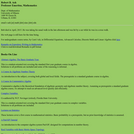
This is a text for a basic course in algebraic number theory.
- Subject:
- Algebra
- Mathematics
- Material Type:
- Textbook
- Provider:
- University of Illinois at Urbana-Champaign
- Author:
- Robert B. Ash
- Date Added:
- 02/16/2011

Algebra | Calculus | Functions | Geometry | Numbers and Operations | Measurement and Data | Ratios and Proportions | Statistics and Probability | Trigonometry

This is a text for a basic course in algebraic number theory.

Why study Quantitative Literacy?
Most students sign up for this course to fulfill a general education mathematics requirement. And this text is certainly aimed at that general audience. But by the time the course is completed, the authors hope that you will have developed some appreciation for the usefulness and elegance of the subject. Without doubt, some level of competency and comfort in working with numerical data is needed to navigate the modern world; and we have tried to cover topics that can be used in day to day life.
In this book, we will focus on problem solving and critical thinking skills. Our goal is not to prepare you just for the next math class, but to equip you with the necessary tools so that you can apply basic mathematical reasoning to a wide variety of commonly encountered problems. Along the way, we will learn basic logic, how to work with percentages and units, the basics of consumer finance, and how to use and interpret basic statistical data.
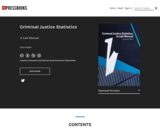
A Lab Manual
Word Count: 2702
(Note: This resource's metadata has been created automatically by reformatting and/or combining the information that the author initially provided as part of a bulk import process.)
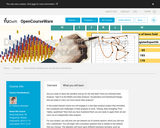
Are you ready to leave the sandbox and go for the real deal? Have you followed Data Analysis: Take It to the MAX() and Data Analysis: Visualization and Dashboard Design and are ready to carry out more robust data analysis?
In this project-based course you will engage in a real data analysis project that simulates the complexity and challenges of data analysts at work. Testing, data wrangling, Pivot Tables, sparklines? Now that you have mastered them you are ready to apply them all and carry out an independent data analysis.
For your project, you will pick one raw dataset out of several options, which you will turn into a dashboard. You will begin with a business question that is related to the dataset that you choose. The datasets will touch upon different business domains, such as revenue management, call-center management, investment, etc.
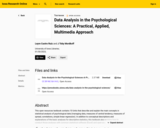
This open resources textbook contains 10 Units that describe and explain the main concepts in statistical analysis of psychological data (managing data, measures of central tendency, measures of spread, correlations, simple linear regression). In addition to conceptual descriptions and explanations of the basic analyses for descriptive statistics, this textbook also explains how to conduct those analyses with common statistical software (Excel) and open-source free software (R). This book is directed to undergraduates studying basic statistics, especially basic statistics in psychological research.
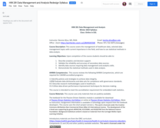
Course Description: This course covers the management of healthcare data, selected data management topics with current importance in the field, and how to use statistical methods in data analysis.
Learning Objectives: Upon completion of the course students should be able to:
1. Describe analytics and decision support.
2. Validate the reliability and accuracy of secondary data sources.
3. Identify data sources requiring data management and analytics skills.
4. Demonstrate the statistical methods used in data analysis.

Cleaning, reshaping, and transforming data for analysis and visualization, with R and the Tidyverse
Word Count: 3515
(Note: This resource's metadata has been created automatically by reformatting and/or combining the information that the author initially provided as part of a bulk import process.)
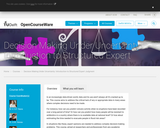
In an increasingly data-driven world, data and its use aren’t always all it’s cracked up to be. This course aims to address the critical lack of any or appropriate data in many areas where complex decisions need to be made.
For instance, how can you predict volcano activity when no eruptions have been recorded over a long period of time? Or how can you predict how many people will be resistant to antibiotics in a country where there is no available data at national level? Or how about estimating the time needed to evacuate people in flood risk areas?
In situations like these, expert opinions are needed to address complex decision-making problems. This course, aimed at researchers and professionals from any academic background, will show you how expert opinion can be used for uncertainty quantification in a rigorous manner.
Various techniques are used in practice. They vary from the informal and undocumented opinion of one expert to a fully documented and formal elicitation of a panel of experts, whose uncertainty assessments can be aggregated to provide support for complex decision making.
In this course you will be introduced to state-of-the-art expert judgment methods, particularly the Classical Model (CM) or Cooke’s method, which is arguably the most rigorous method for performing Structured Expert Judgment.
CM, developed at TU Delft by Roger Cooke, has been successfully applied for over 30 years in areas as diverse as climate change, disaster management, epidemiology, public and global health, ecology, aeronautics/aerospace, nuclear safety, environment and ecology, engineering and many others.
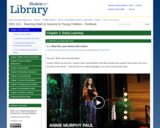
Compiled to support a course on teaching math and science in Early Childhood Education. Chapters include: Early Learning; Math & Science Connections; Theory & Teacher Effectiveness; Special Needs; Standards & Assessment; Lesson Planning; Centers & Environment; Teaching Science Content; Teaching Math Content; and Hands-on Learning.
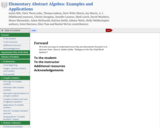
This book is not intended for budding mathematicians. It was created for a math program in which most of the students in upper-level math classes are planning to become secondary school teachers. For such students, conventional abstract algebra texts are practically incomprehensible, both in style and in content. Faced with this situation, we decided to create a book that our students could actually read for themselves. In this way we have been able to dedicate class time to problem-solving and personal interaction rather than rehashing the same material in lecture format.
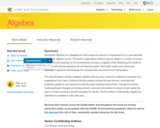
Elementary Algebra is designed to meet the scope and sequence requirements of a one-semester elementary algebra course. The book’s organization makes it easy to adapt to a variety of course syllabi. The text expands on the fundamental concepts of algebra while addressing the needs of students with diverse backgrounds and learning styles. Each topic builds upon previously developed material to demonstrate the cohesiveness and structure of mathematics.
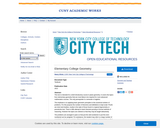
This text is intended for a brief introductory course in plane geometry. It covers the topics from elementary geometry that are most likely to be required for more advanced mathematics courses. The only prerequisite is a semester of algebra.
The emphasis is on applying basic geometric principles to the numerical solution of problems. For this purpose the number of theorems and definitions is kept small. Proofs are short and intuitive, mostly in the style of those found in a typical trigonometry or precalculus text. There is little attempt to teach theorem-proving or formal methods of reasoning. However the topics are ordered so that they may be taught deductively.
The problems are arranged in pairs so that just the odd-numbered or just the even-numbered can be assigned. For assistance, the student may refer to a large number of completely worked-out examples. Most problems are presented in diagram form so that the difficulty of translating words into pictures is avoided. Many problems require the solution of algebraic equations in a geometric context. These are included to reinforce the student's algebraic and numerical skills, A few of the exercises involve the application of geometry to simple practical problems. These serve primarily to convince the student that what he or she is studying is useful. Historical notes are added where appropriate to give the student a greater appreciation of the subject.
This book is suitable for a course of about 45 semester hours. A shorter course may be devised by skipping proofs, avoiding the more complicated problems and omitting less crucial topics.
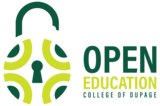
A textbook created by COD Mathematics Faculty for MATH 0470 - Elementary Plane Geometry at the College of DuPage.
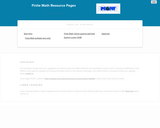
Mathematics
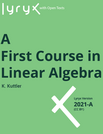
This text, originally by K. Kuttler, has been redesigned by the Lyryx editorial team as a first course in linear algebra for science and engineering students who have an understanding of basic algebra.
All major topics of linear algebra are available in detail, as well as proofs of important theorems. In addition, connections to topics covered in advanced courses are introduced. The text is designed in a modular fashion to maximize flexibility and facilitate adaptation to a given course outline and student profile.
Each chapter begins with a list of student learning outcomes, and examples and diagrams are given throughout the text to reinforce ideas and provide guidance on how to approach various problems. Suggested exercises are included at the end of each section, with selected answers at the end of the text.
Lyryx develops and supports open texts, with editorial services to adapt the text for each particular course. In addition, Lyryx provides content-specific formative online assessment, a wide variety of supplements, and in-house support available 7 days/week for both students and instructors.
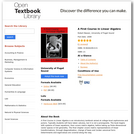
A First Course in Linear Algebra is an introductory textbook aimed at college-level sophomores and juniors. Typically students will have taken calculus, but it is not a prerequisite. The book begins with systems of linear equations, then covers matrix algebra, before taking up finite-dimensional vector spaces in full generality. The final chapter covers matrix representations of linear transformations, through diagonalization, change of basis and Jordan canonical form. Determinants and eigenvalues are covered along the way.
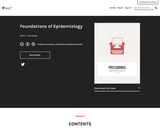
Short Description:
Foundations of Epidemiology is an open access, introductory epidemiology text intended for students and practitioners in public or allied health fields. It covers epidemiologic thinking, causality, incidence and prevalence, public health surveillance, epidemiologic study designs and why we care about which one is used, measures of association, random error and bias, confounding and effect modification, and screening. Concepts are illustrated with numerous examples drawn from contemporary and historical public health issues. Data dashboard
Word Count: 47382
ISBN: 978-1-955101-03-5
(Note: This resource's metadata has been created automatically by reformatting and/or combining the information that the author initially provided as part of a bulk import process.)
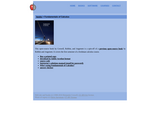
This open-source book by Crowell, Robbin, and Angenent is a spin-off of a previous open-source book by Robbin and Angenent. It covers the first semester of a freshman calculus course.
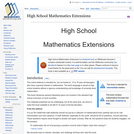
This online textbook is intended for, but not limited to, 14 to 18 year old teenagers who have a general interest in mathematics. The text's language is aimed at high school students without a rigorous understanding and knowledge of university-level mathematics.
This book introduces several interesting topics not covered in the standard high school curriculum of most countries.
The materials presented can be challenging, but at the same time, we strive to make this book readable to all with 9–10 years of formal education.
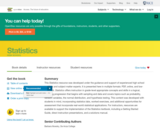
This Statistics resource was developed under the guidance and support of experienced high school teachers and subject matter experts. It is presented here in multiple formats: PDF, online, and low-cost print. Statistics offers instruction in grade-level appropriate concepts and skills in a logical, engaging progression that begins with sampling and data and covers topics such as probability, random variables, the normal distribution, and hypothesis testing. This content was developed with students in mind, incorporating statistics labs, worked exercises, and additional opportunities for assessment that incorporate real-world statistical applications. For instructors, resources are available to support the implementation of the Statistics textbook, including a Getting Started Guide, direct instruction presentations, and a solutions manual.